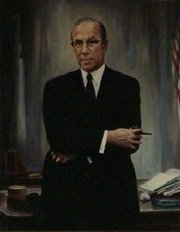George P. Shultz
|
|
George Pratt Shultz (born December 13, 1920) served as the U.S. Secretary of State from 1982 to 1989 and as the U.S. Secretary of the Treasury from 1972 to 1974 and United States Secretary of Labor from 1969 to 1970.
Shultz is a member of the Hoover Institution, American Enterprise Institute New Atlantic Initiative, the Committee for the Liberation of Iraq and the Committee on the Present Danger. He also serves on the board of directors for the Bechtel Corporation, Gilead Sciences, and Charles Schwab Corporation.
Shultz received a B.A. degree in economics from Princeton University in 1942. and joined the U.S. Marine Corps and served until 1945. In 1949, Shultz earned a Ph.D. from the Massachusetts Institute of Technology degree in industrial economics.
He taught at MIT from 1948 to 1957, with a leave of absence in 1955 to serve on President Dwight Eisenhower's Council of Economic Advisers as a senior staff economist.
In 1957, Shultz joined the University of Chicago Graduate School of Business as professor of industrial relations. Later, he was named dean in 1962.
Shultz served as President Richard Nixon's secretary of labor from 1969 to 1970, after which he was director of the Office of Management and Budget. He then became secretary of the Treasury from May 1972 to May 1974.
In 1974, he left government service to become president and director of Bechtel Group. On July 16, 1982, he was appointed by President Ronald Reagan to serve as the sixtieth U.S. secretary of state. A dove on foreign policy, he frequently clashed with the more hawkish members of the Reagan administration. In particular, he was well known for outspoken opposition to the "arms for hostages" scandal that would eventually become the Iran Contra situation. Shultz was a leading proponent of a U.S. invasion of Nicaragua. In a 1983 testimony before congress he said "we must cut the Nicaguan cancer out." He was also opposed to any negotiation with the government of Daniel Ortega, "Negotiations are a euphemism for capitulation if the shadow of power is not cast across the bargaining table."
George Shultz left office on January 20, 1989 but continues to be a strategist for the Republican Party. He was an advisor for the George W. Bush 2000 Campaign.
Honors and Prizes
- Received the Presidential Medal of Freedom (January 19, 1989).
- Received the Seoul Peace Prize (1992).
- Received the Eisenhower Medal for Leadership (2001).
External links
- Pierre Rinfret (http://www.rinfret.com/gs.html) on his government service with Shultz
- Shultz op-ed in NYTimes (http://www.nytimes.com/2004/08/04/opinion/04shultz.html?ex=1113192000&en=33091a65c0022553&ei=5070&8bl&oref=login) on economic records of George H. W. Bush, Bill Clinton, George W. Bush
- response to op-ed (http://www.j-bradford-delong.net/movable_type/2004_archives/001278.html) by J. Bradford DeLong
| Preceded by: W. Willard Wirtz | United States Secretary of Labor 1969–1970 | Succeeded by: James D. Hodgson |
| Preceded by: John B. Connally | United States Secretary of the Treasury 1972–1974 | Succeeded by: William E. Simon |
| Preceded by: Alexander Haig | United States Secretary of State 1982–1989 | Succeeded by: James Baker |

